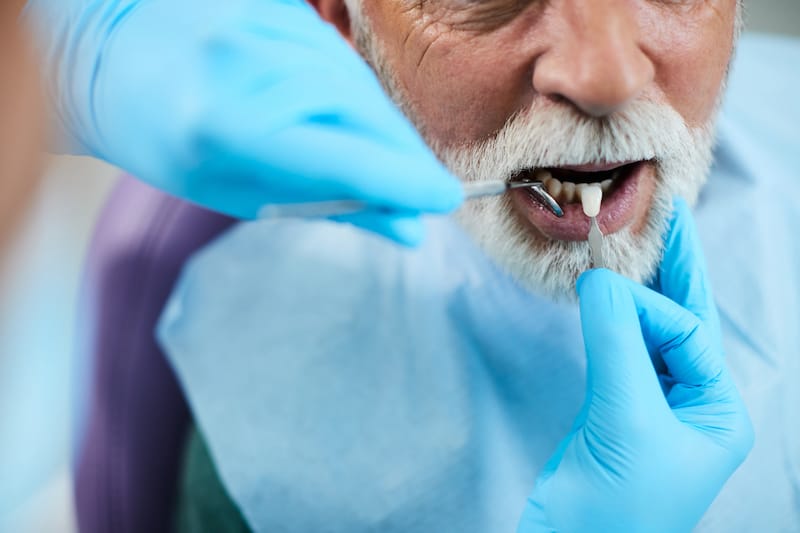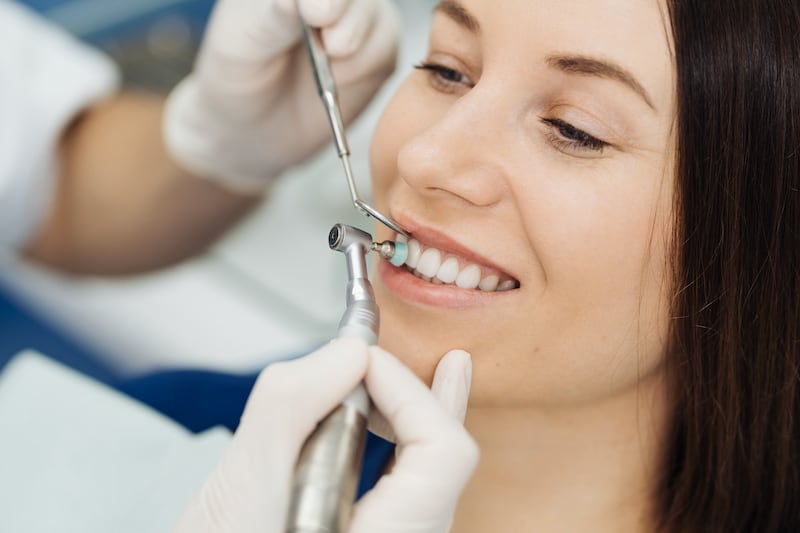Many of our customers come to us with insecurities around how their teeth look – it could be chipped teeth, a dead tooth that has gone black, or crooked and stained teeth which are making them embarrassed to smile or even be in social situations.
Veneers are one of the most popular cosmetic dentistry treatments we do in our Brisbane clinic and can address most of these problems by replacing one or multiple teeth that gives them the confidence to smile again.
Naturally, our customers have a lot of questions before making the decision to get veneers…
As a leading dentist for cosmetic dentistry, restorative dentistry, and preventative and general dentistry, we can answer all of these questions and more.
Our guide on ‘what to know about veneers’ will tell you everything you need to know and have been wondering about veneers.
And of course, if you have any other questions or want to talk to a cosmetic dentist, just call our friendly team at Bite Dental in Brisbane CBD.
What are veneers?
A dental veneer is a thin shell replicating a natural tooth made from porcelain or composite resin.
The veneer is placed over an entire tooth and secured using dental cement (otherwise known as bonding cement) or affixed into place and ‘cured’ to harden, cover imperfections and create the appearance of new teeth and restore a beautiful smile that looks natural.
Why your dentist may recommend veneers
Dental veneers are a cosmetic procedure often paired with teeth whitening treatments to create a more beautiful, whiter smile that looks healthy and mimics the appearance of natural teeth.
When you come in for a complimentary cosmetic dental consultation, your dentist will talk you through the options, the process, and what would be best for your smile.
The purpose of dental veneers
Dental veneers conceal a range of tooth imperfections in your existing teeth, including hiding a chipped tooth, or broken tooth, improving the appearance of significantly stained teeth, hiding gaps in teeth, and more.
How veneers work
Veneers are usually placed only over teeth that are visible when smiling, known as the ‘smile zone’, which includes your front teeth, on the top and bottom.
When getting dental veneers, you may have one veneer to replace one imperfect tooth or several.
What are veneers made from?
Porcelain veneers, made from porcelain, and composite veneers (also known as resin veneers or composite resin veneers), made from composite resin, are the two main types of dental veneers in Australia.

The Pros and Cons of Veneers
The benefits of veneers (Pros)
- Dental veneers look like natural teeth.
- A veneer will cover your tooth imperfections.
- Dental veneers can be ‘permanently’ bonded, meaning they can last for several years.
- Veneers can help you achieve a whiter smile and can be coloured to blend with your teeth.
- Veneers can be adjusted in size and colour before being placed.
- They’re long lasting – a set of veneers lasts around ten years or longer.
- Veneers are not fully permanent – while long-lasting, they can be replaced if needed (like if your face changes or you age).
- Low-risk – less invasive than crowns or caps and do not require extensive gum or existing teeth shaping to install.
The limitations of veneers (cons)
- Once installed, removing veneers will affect the appearance of your teeth until new veneers are installed.
- If you grind your teeth, this can damage your veneers as well as the underlying tooth and can cause you to need additional dental treatments such as crowns, caps, implants or other procedures.
- Veneers need to be looked after, just as normal teeth do.
How much do teeth veneers cost?
The cost of veneers varies depending on the number of veneers, the type; full or partial veneers, porcelain or composite resin. You do not need to cover every tooth, or the entire tooth, only the parts you wish to conceal. You may also want to consider other additional treatments beforehand, such as professional teeth whitening.
When you book a free cosmetic consultation with our Brisbane dentistry experts at Bite Dental, we will talk you through all of these options.
The cosmetic veneers process: what to expect
Tooth veneers work by using the ‘shell’ of porcelain or composite resin, which looks just like a natural tooth, to cover your existing teeth with a wafer thin layer. The veneer looks just like a real tooth, with a natural colour and can give you a straighter, whiter smile that looks picture-perfect.
Veneer tooth preparation
Within the process, a small amount of the surface of the natural tooth is removed – approximately 0.3mm to 0.5mm – to maintain your natural tooth structure and strength and protect the nerve of the tooth. This ensures that your veneers will last a long time and be easy to replace if needed in the future.
Your veneers will be matched in colour and shape to compliment and blend in with your natural teeth and natural colour, and teeth whitening is an option if you would like to take this opportunity to achieve an overall whiter smile.
Our experienced dental team at Bite Dental will discuss all of your options with you when you come in for your consultation.
The veneer procedure process:
Veneer treatments will usually be done over a series of appointments, from the preliminary steps of looking at your teeth and smile’s unique features, taking bite impressions, studying the form and function of your teeth and mouth, taking the necessary x-rays and moulds, to preparing your teeth and getting temporary veneers, and placing the final veneers.
Porcelain veneers are customised and custom made to fit each individual tooth and are cemented into place.
Composite veneers are individually sculpted onto each of the natural teeth being covered, and then cured with light to harden every layer, then the surface is polished.
We walk you through the process, every step of the way and take the time to ensure that you feel comfortable, happy, at ease, have all your questions answered, and most of all, are excited for your new and improved smile!
Answers to common questions we get about veneers in Brisbane
How long do teeth veneers last for?
A set of veneers usually lasts for around ten years. Porcelain veneers are longer-lasting than composite veneers and provide a more tooth-like natural look.
Does a veneer damage your teeth / are dental veneers good for teeth?
The simple answer is, a veneer will not damage your teeth. That is, as long as you take good care of your veneers and your dental health and hygiene.
It is important to note that traditional veneers (porcelain veneers) are not reversible, as part of the enamel from the existing tooth is trimmed or shaved to allow for the veneer to fit and look perfect. This changes the structure of the tooth permanently. While new veneers can be placed, the tooth will appear different if no veneers were to be reapplied.
What is the wait time between the prep and getting my veneers fitted?
One of the biggest fears around getting dental veneers is the interim wait between the prep and getting your veneers. At Bite Dental, we have our own in-house lab to create the highest quality veneers, with the quickest turnaround times. It means the average two-week wait, that other dentists have, is shortened to just a day or so. We’ll also fit temporary veneers at this time so you can remain confident in your smile.
Can I see some veneers before and after photos?
Certainly! At Bite Dental, we pride ourselves on transforming smiles and instilling confidence and peak dental health to our valued clients. We have a range of before and after photos that we would love to show you. Book a free cosmetic dental consultation with our friendly and experienced dentists to learn more and see some before and after examples today.
Is it painful to get veneers?
The process to get veneers is usually relatively pain free. For some people with overly sensitive teeth, there may be some slight discomfort, but there is not any significant pain. At Bite Dental, we place your comfort and ease as a high priority, and we’ll always do whatever we can to make your visit as comfortable and pain-free as possible. We can offer local anaesthetic and other options if you are concerned or if it looks like discomfort may be experienced.
Do I need to get my teeth shaved for veneers?
Usually, a small amount of the surface of the natural tooth is removed via buffing, shaving or grinding, to approximately 0.3mm to 0.5mm.
This is to ensure that the ‘tooth’ with the veneer is not too thick, and to allow the veneer to be placed flush against the surface of the tooth.
The shaving is done within this range, to maintain your natural tooth structure and strength and protect the nerve of the tooth.
At Bite Dental we will place temporary veneers over your teeth after they have undergone the preparation phase, so that you can still have a normal-looking smile until the final veneers are affixed.
Are veneers permanent?
Veneers are semi-permanent, meaning a set of veneers usually lasts 10 years. However, they can be replaced if they need adjusting – for example, if your face and smile shape changes due to age or cosmetic facial treatments, or the colour of your teeth changes.
Will a veneer look like a natural tooth?
Veneers look and feel very much like natural teeth and can even look better, as they cover imperfections. Veneers can be shaped and coloured to blend in with your natural smile.

Can you bite on veneers?
Veneers operate and look like normal teeth, but are not as strong as normal teeth and are susceptible to wear and tear if you are not careful. Therefore, while you can bite down as you would with normal teeth, it is recommended to not bite hard, or onto hard food items or objects.
Permanent veneers are stronger than temporary veneers and more resistant to stains, however caution should be taken with all types of veneers to ensure their longevity.
There are certain foods and drinks which should be avoided with veneers, and those with temporary veneers need to be extra careful.
Do veneers help with bite?
If you have broken or chipped teeth or crooked teeth, veneers can help with your bite. In some situations, veneers can also help with open bite.
Can you get veneers with an open bite?
Whether or not veneers can assist with open bite depends on the severity of the condition. If the open bite is minor, using veneers to fix the issue is a possibility. That is, if the gap in the teeth is relatively small and unnoticeable.
Can I get temporary veneers?
Yes. Temporary veneers are used when tooth preparation has been done, before the final veneers are placed.
Bite Dental patients have a much shorter wait between preparation and final veneer placement, as we have an on-site lab which results in shorter time frames for dental lab work.
However, we’ll also provide you with temporary veneers so you can maintain a normal smile for the short time in between.
Is there an option between full and partial veneers?
You can get full veneers that completely cover the tooh, or partial veneers which hide specific problem areas of a tooth, such as damaged or discoloured areas. This is dependent on your current tooth structure, dental health and the dental concerns you are wanting to rectify.
Do veneers help with crooked teeth?
Yes, for slightly crooked teeth, veneers are often an excellent option.
What are porcelain veneers, and what are composite veneers? Is one better?
The two main types of veneers are porcelain veneers and composite veneers.
Composite resin veneers are the most affordable option for those with budget as a main concern. Porcelain veneers are generally more expensive but are better at resisting stains, look more like a healthy natural tooth due to their shine, and can last longer.
Porcelain veneers are the traditional veneers and have been used in cosmetic procedures for a long time. They are considered a better quality veneer, but for those with a lower budget, composite veneers provide a lower price point.
Porcelain veneers look almost like fake fingernails, except they appear like teeth – and bond to the front of the existing tooth it is covering. Porcelain veneers look and feel very natural as they are custom made for that tooth.
Composite veneers are applied slowly, one layer followed by another, until the natural tooth is covered. Every individual composite resin veneer layer is shaped as it is applied.
Composite resin veneers are applied in a slightly different way to porcelain veneers. Composite veneers are sculpted layer by layer onto the tooth and cured with light in order to harden each individual layer, and then polished. Porcelain veneers are individually custom-made for each of the teeth they are concealing and are cemented into place.
Are veneers right for you?
If you are considering veneer work, an experienced dentist will be able to evaluate your teeth and smile and advise you as to the best solution to achieve your desired result, including whether veneers are the right solution for you, or whether another cosmetic procedure or alternative options will be a better fit.
Talk to the Brisbane veneers experts
At Bite Dental, our highly qualified and experienced cosmetic dentists are passionate about helping you to achieve a beautiful, healthy and happy smile that restores your self-confidence.
Book an appointment to visit us in our state-of-the-art Brisbane dental studio, based in Queen Street and speak to a leading dentist in our team to learn more.
We offer free cosmetic consultations and new patient offers with fantastic value.

